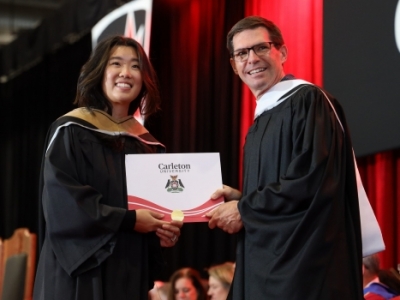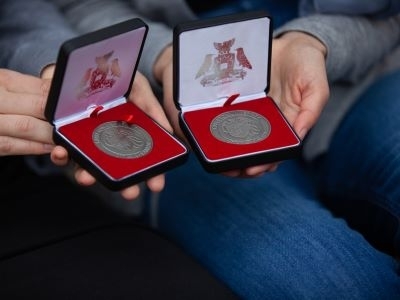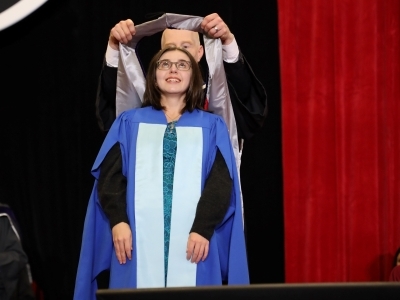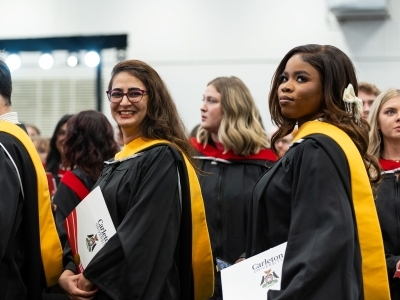–The following story was written by Taia Goguen-Garner.
What would you do if you could identify if someone near you has COVID-19 just by the sound of their cough?
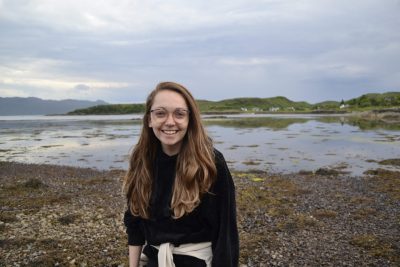 Madison Cohen-McFarlane, a PhD student in Biomedical Engineering is researching the application of audio-based health sensing for smart-home remote monitoring.
Madison Cohen-McFarlane, a PhD student in Biomedical Engineering is researching the application of audio-based health sensing for smart-home remote monitoring.
“In my lab, we mainly focus on helping older adults live independently at home with the use of technology,” explained Cohen-McFarlane. “Generally speaking, I am interested in monitoring health-related sounds like coughs, sneezes, snores and restricted breathing.”
Prior to the pandemic, Cohen-McFarlane had been looking for ways to evaluate cough sounds in terms of their frequency and severity.
“More forceful coughs and more frequent coughing can be an indication of a worsening health condition,” shared Cohen-McFarlane. “Being able to track and monitor this could be very helpful to healthcare providers when making treatment decisions. Furthermore, I was interested in if specific cough types (e.g. wet coughs, dry coughs, wheezing and whooping cough) were associated with different conditions.”
After the pandemic hit, Cohen-MacFarlane found herself watching interviews with COVID-19-positive individuals.
“I noticed that many of them coughed a few times during the interviews and thought it would make a very interesting and relevant database for rapid audio-based algorithmic development,” said Cohen-McFarlane. “I was able to create one of the first databases of COVID coughs in the world called the Novel Coronavirus Cough Database (NoCoCoDa) which contains 73 individual COVID-19 positive reflex cough sounds (published in IEEE Access in August of this year).”
 From there, Cohen-MacFarlane wanted to investigate if there were any interesting markers of the COVID-19 cough. She is collecting her data by obtaining coughs from public media interviews and performing the analysis from her home office.
From there, Cohen-MacFarlane wanted to investigate if there were any interesting markers of the COVID-19 cough. She is collecting her data by obtaining coughs from public media interviews and performing the analysis from her home office.
“I am still investigating the cough characteristics, specifically with respect to the disease progression,” explained the grad student. “As many people now know, the COVID cough is initially dry (like an irritation in your throat), but in more severe cases of the disease, it can become more wet or productive (think the kind of cough you get when you have a cold).”
Cohen-MacFarlane has always been interested in how humans interpret the world around them, specifically how we hear the world.
“I actually went to an arts high school for music,” said Cohen-McFarlane. “Recently someone pointed out that I came full circle now that I’m working in audio again, even though I didn’t make a career out of music.”
Cohen-MacFarlane’s interest in the research stemmed from her fourth-year engineering project during her undergraduate degree where she focused on sound separation and localization.
“As a biomedical engineer, I am really interested in creating solutions to health-related problems, and audio analysis of human health sounds was a perfect fit,” shared Cohen-McFarlane.
The grad student suggests that this may aid in contact tracing as a cough could be identified and localized to a particular area on a video monitoring system and the people around that person could be identified.
“It could also be applied to medical waiting rooms and used as a pre-screening tool,” explained Cohen-McFarlane. “Rather than asking an individual how bad their cough is, the algorithm could potentially tell the medical professional what kind of cough they have, how many times they coughed while waiting and how severe the cough is.”
Dr. Rafik Goubran, Vice-President (Research and International) for Carleton and Dr. Frank Knoefel, physician at Elisabeth Bruyere Hospital and Adjunct Research Professor in the Department of Systems and Computer Engineering have been supervising Cohen-MacFarlane throughout her research.
“My background is in engineering so having Dr. Knoefel with his medical knowledge is invaluable,” expressed the student. “Both of them are incredibly supportive and have each provided me with many opportunities from presenting some of our team’s work at one of the Nature Nocturne events to traveling to Taipei Taiwan for a conference. Arguably the most important piece for me is that I feel like I can approach them with any idea/problem, and they will take the time (out of their incredibly busy schedules) to respond and give feedback to me.”
Cohen-MacFarlane wishes to continue her research in this field, either in industry or in academia.
“It would be really cool if a cough classification system that I contributed to was implemented in practice. Maybe it will be someday!”
Monday, November 16, 2020 in Grad Student Research, News
Share: Twitter, Facebook
